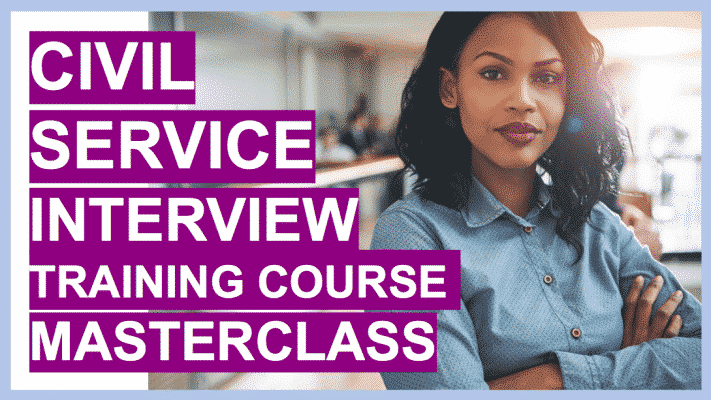During the Civil Service Fast Stream application process, you may be invited to participate in E Tray exercises. These are activities which test your ability to handle workload, as well as make quick decisions about what to say and do. Today, we’ll be taking a look at an example exercise so that you can get some E Tray exercise practice. This is relevant both to the UK Civil Service, as well as the Civil Service in Ireland.
What is E Tray?
E Tray exercises are simulations of possible scenarios you might encounter whilst at a computer workspace. Unlike “In-Tray” exercises, which are completed on paper, E Tray exercises are completed online, so you’ll need access to a computer in order to complete them. You are tested via a series of emails and requests which arrive in a virtual email inbox. Before moving onto E Tray exercise practice, we’re going to break down the exercise into three stages.
Stage 1 – Reading and comprehending the background information.
In this stage, you’ll be presented with the necessary background information for the scenario. This might include details about your “job”, who you work for, who your colleagues are as well as details about your clients. You need to read this information carefully in order to succeed. There’s a strict time limit, but don’t rush or skim through this section – make sure you understand all of the key details before continuing. Take notes and try to index the documents rather than re-writing them.
Stage 2 – Identifying the least and most effective responses to a series of emails.
In this stage, you’ll have to read a series of emails which are typical for the job that you’re applying for. You need to filter out the most important emails, answering them quickly and effectively. Remember that once you complete an email, you can’t return to it. So, make sure you double-check your answer before sending it off.
The more emails you answer, the more will arrive in your inbox. In addition, the new emails will change depending on how you’ve answered previous ones. This means that you need to think carefully about how you answer each email.
Make sure that you check email attachments for additional details, and make use of what you read and made note of in the first section. In particular, keep an eye on smaller pieces of information, since they can make a big difference.
Stage 3 – Writing a response.
In this final task, you need to write a response, which usually takes the form of a memo. Here, you’re being assessed on your ability to respond in a professional manner, using the information you’ve gathered form stages 1 and 2.
For this section in particular, you need to consider your writing style:
• You need to make sure your argument/response is well-structured;
• Do not use bullet-points at this stage. Write your memo out in prose (like how we’ve written this post);
• Make use of paragraphs, using each paragraph to address a different point;
• Paraphrase the information from the previous sections rather than quote it directly;
• Objectivity is key;
• Pay attention to spelling, punctuation, and grammar.
E Tray Exercise Practice – Example Questions
Take a look at the following example. Make use of the tips above and use this as E Tray exercise practice. Remember that the actual exercise will be automated – this is as close as we can make it in a blog post.
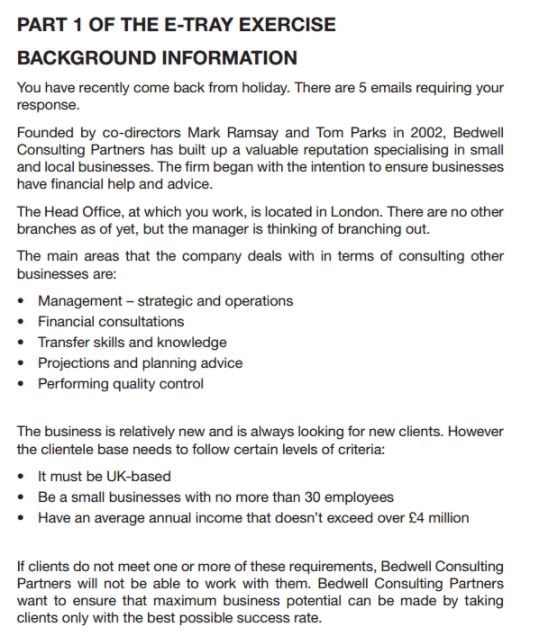
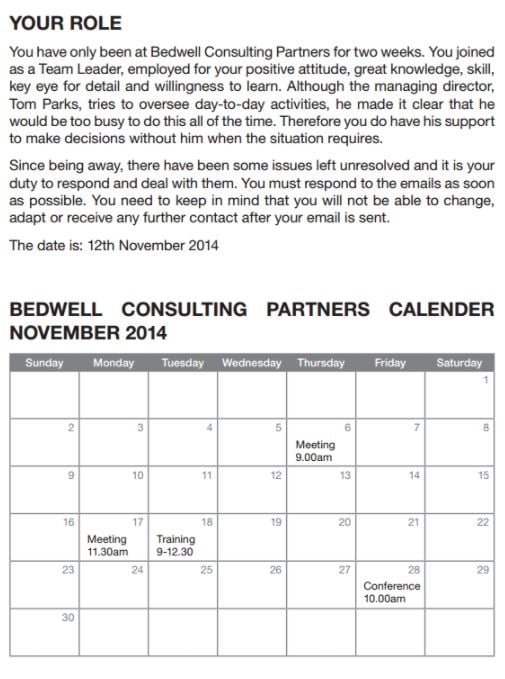
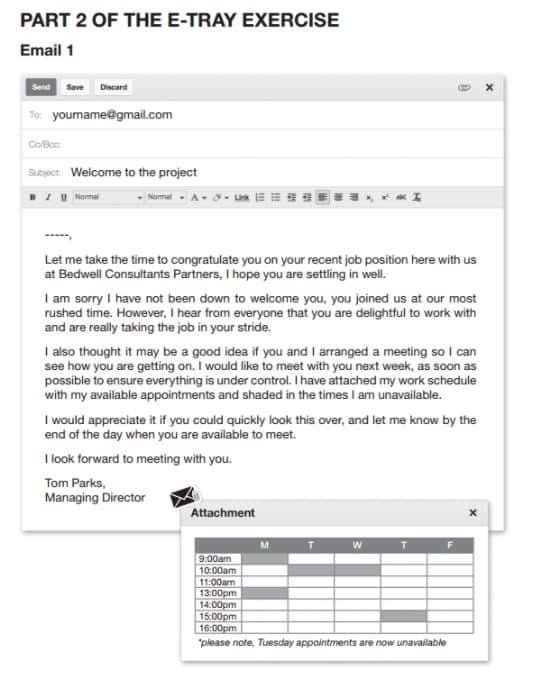
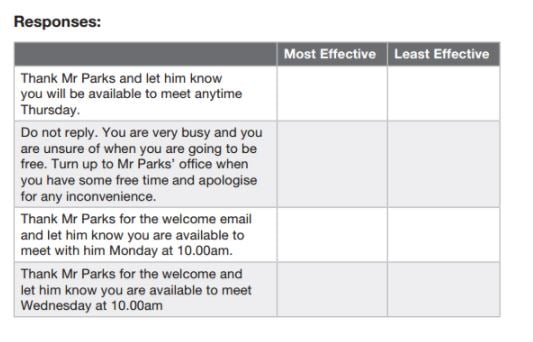
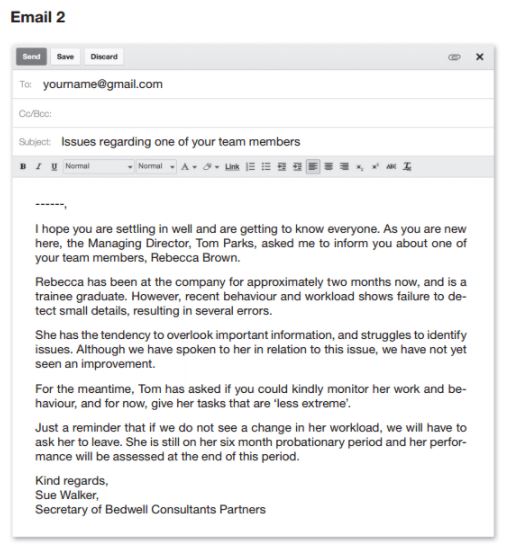
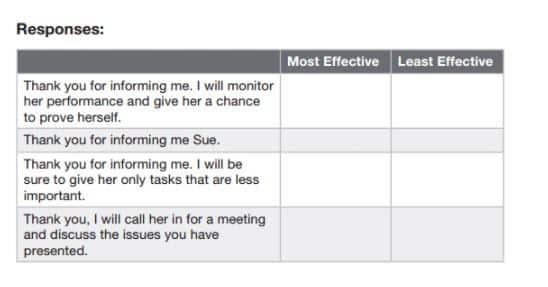
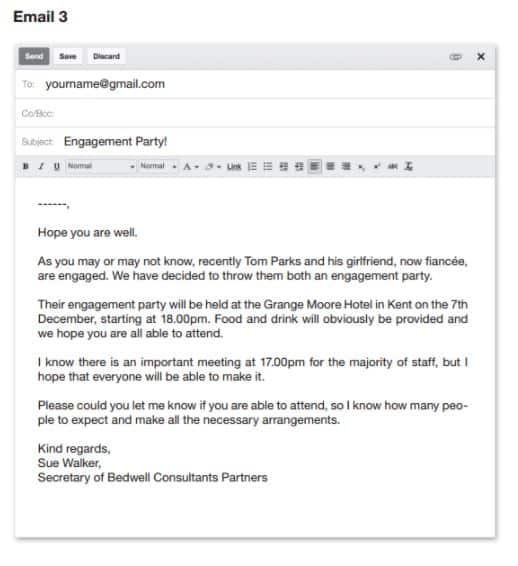
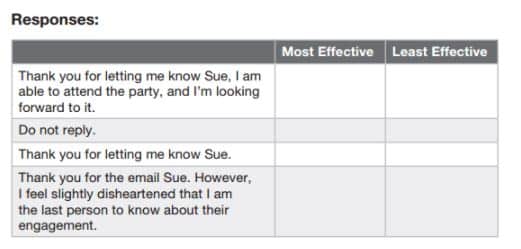
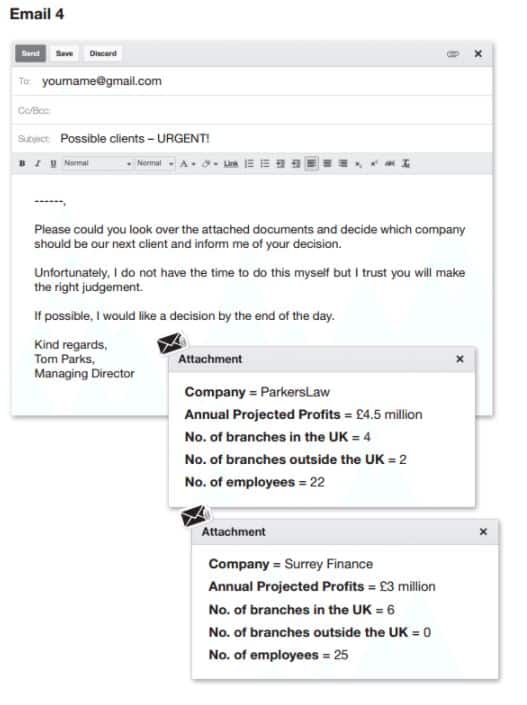
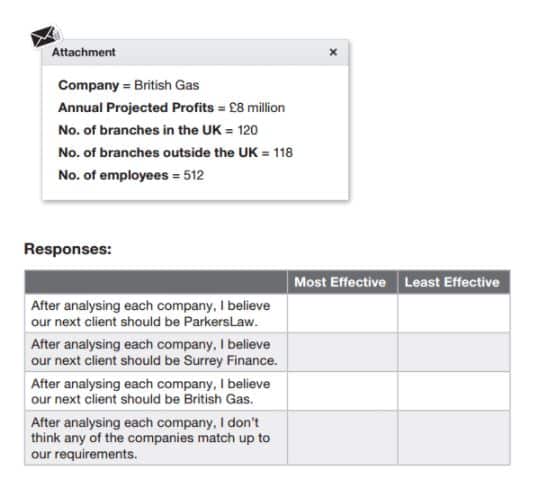
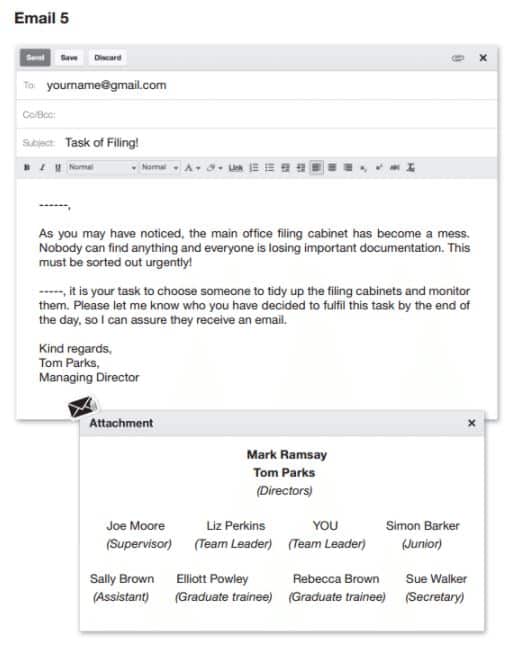
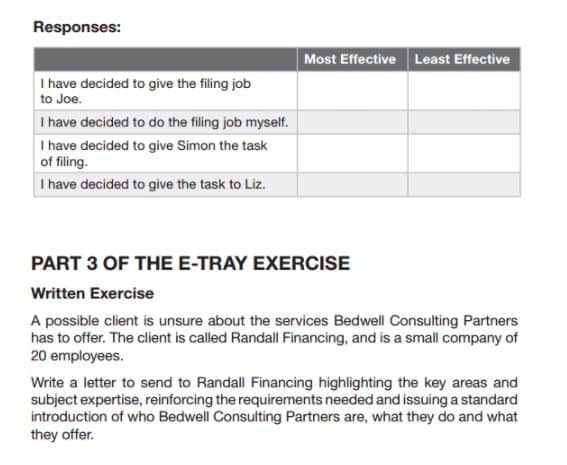
Answers
Now that you’ve finished the questions, take a look at the answers and see where you did well and where you need to improvement. In particular, pay attention to the E Tray exercise tips we’ve included for each answer.
Email 1
“Thank Mr Parks for the welcome email and let him know you are available to meet with him Monday at 10.00am.”
• This would be the MOST EFFECTIVE response as it’s the soonest availability for a meeting.
“Thank Mr Parks for the welcome and let him know you are available to meet Wednesday at 10.00am.”
• This would be the LEAST EFFECTIVE response. It’s the least effective because it clashes with another appointment.
“Thank Mr Parks and let him know you will be available to meet anytime Thursday.”
• This would be an ineffective response because they ask for the soonest available time, this would not be it.
“Do not reply. You are very busy and you are unsure of when you are going to be free. Turn up to Mr Parks’ office when you have some free time and apologise for any inconvenience.”
• This would be ineffective because not replying is inconsiderate and shows lack of professionalism.
Email 2
“Thank you for informing me. I will monitor her performance and give her a chance to prove herself.”
• This would be the MOST EFFECTIVE response as it allows you to analyse the issues yourself and not jump to any conclusions too soon.
“Thank you for informing me. I will be sure to give her only tasks that are less important.”
• This would be the LEAST EFFECTIVE response, it will not allow the employee to improve her performance and therefore would not be addressing the situation.
“Thank you for informing me Sue.”
• This would be an ‘ok’ response as it allows Sue to know you received her email and you have taken in the information.
“Thank you, I will call her in for a meeting and discuss the issues you have presented.”
• This would not be an appropriate response because you are new to your role and therefore you have not yet seen her performance for yourself.
Email 3
“Thank you for letting me know Sue, I am able to attend the party, and I’m looking forward to it.”
• This is the MOST EFFECTIVE response as it informs Sue that you are able to attend and you received the email.
“Thank you for the email Sue. However, I feel slightly disheartened that I am the last person to know about their engagement.”
• This is the LEAST EFFECTIVE response because it is unprofessional and the incorrect way to handle a situation.
“Do not reply.”
• This response does not let Sue know whether you are able to attend or if you received the email.
“Thank you for letting me know Sue.”
• This is an ‘ok’ response because it makes Sue aware that you have received her email.
Email 4
“After analysing each company, I believe our next client should be Surrey Finance.”
• This is the MOST EFFECTIVE response because it meets all the 150 Civil Service Fast Stream Test Guide requirements of the company. (Remember to look at the background information given in stage 1).
“After analysing each company, I believe our next client should be British Gas.”
• This would be the LEAST EFFECTIVE response because its projected annual income is considerably higher to what the company looks for in clients, there are more employees and branches outside the UK, all of which are not suitable.
“After analysing each company, I believe our next client should be ParkersLaw.”
• This is an ineffective response because it earns more money than suitable to be a client for the company.
“After analysing each company, I don’t think any of the companies match up to our requirements.”
• This is not an appropriate response because at least one of them does match up with the company requirements.
Email 5
“I have decided to give Simon the task of filing.”
• This would be the MOST EFFECTIVE response because Simon is a junior, and filing would be a typical task for that job.
“I have decided to give the filing job to Joe.”
• This would be the LEAST EFFECTIVE response because Joe is a supervisor and therefore has other, more important responsibilities.
“I have decided to do the filing job myself.”
• This would be an ineffective response because you should be leading a team of people, rather than doing work that could be given to someone else.
“I have decided to give the task to Liz.”
• This would be an ineffective response because Liz is also a Team Leader and therefore could give the task to somebody else.
Written Exercise – Sample Response
Thank you for your recent enquires. We have taken it upon ourselves to research Randall Financing in order to provide you with accurate information.
Let me start off by saying a little about our company. Here at Bedwell Consulting Partners we offer expertise and long-term help and advice to consult businesses and help them fully reach their business potential.
Founded in 2002, we have continuously grown as a consulting business and gained a valuable reputation within the industry. Our company aims to provide local and small businesses in areas such as management, financing, skills, knowledge, projection planning and performing quality control to ensure companies are fully equipped and ready to succeed.
In order to become a client of ours, your business has to meet some requirements. We take clients who are only based in the UK. We are hoping to branch out soon, but for the meantime we do not have the equipment or necessities needed to support clients outside of the United Kingdom.
Secondly, businesses have to be small-scale. We only take clients with no more than 30 employees, and from your recent enquiry, you certainly meet this requirement.
We also only take clients whose projection annual income is less than £4 million. This is to ensure that we remain effective and relevant to your business needs.
Unfortunately, if you do not meet anyone of these requirements we are unable to work with you. However, if you do meet the requirements to become part of our clientele base, please feel free to send us an email if you require more information, or you have decided to work alongside us.
We look forward to hearing from you here at Bedwell Consulting Partners.
Kind Regards,
——–
Conclusion
So, you should now have some E Tray exercise practice, as well as an understanding of how the process works, and what assessors are looking out for. You’ve also been given some handy E Tray exercise tips that you can use in your practice and in the real thing. Next week, we’ll be discussing the civil service fast stream competencies. You can get more E Tray exercise practice in our book, CIVIL SERVICE FAST STREAM: Sample test questions for the Fast Stream Civil Service Tests.
Got a Civil Service interview coming up?
If you’ve got a civil service interview coming up, then we’ve got the perfect resource for you! Check out our excellent online course for a comprehensive overview of everything needed to ace the civil service interview!
https://www.how2become.com/courses/civil-service-interview-questions-and-answers/
